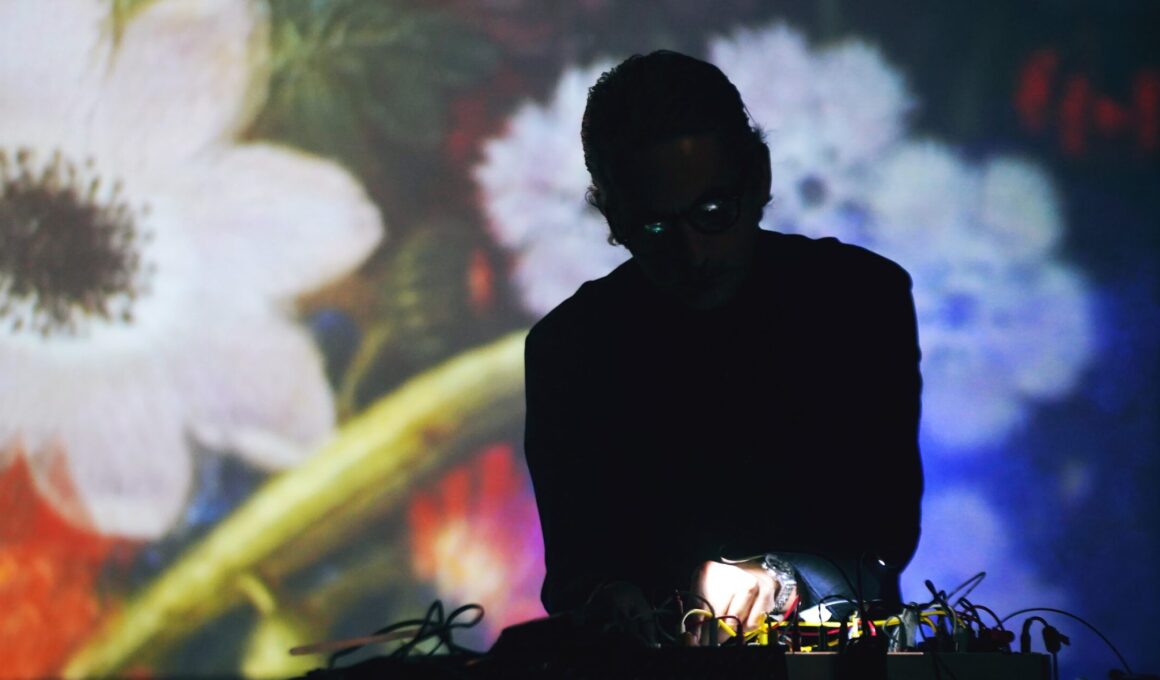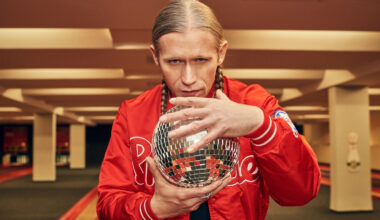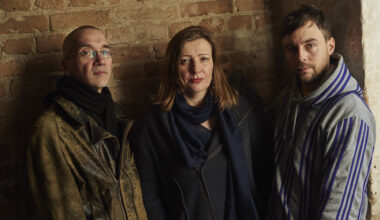Abul Mogard is an alter-ego created by Guido Zen, an Italian musician currently based in Rome. He has performed at renowned venues such as Berlin Atonal, Poesia En Voz Alta, Auditorium San Fedele and South Bank Centre.
The Organ Reframed Festival commissioned him to write a composition for the pipe organ that he performed at London’s Union Chapel with the London Contemporary Orchestra. He has remixed Carl Craig and Fovea Hex (with Brian Eno) and his music has been used for films by Ridley Scott, in BBC TV programmes, accompanying contemporary artworks, and at fashion shows for Ferragamo. His latest works are “Live at the Athens Conservatoire” and the forthcoming collaborative album “Impossibly Distant, Impossibly Close” with Rafael Anton Irisarri on the latter’s newly-formed Black Knoll Editions label.
FACTS
1. I feel extremely sad and in disbelief about the relentless tragedy unfolding in Gaza.
2. It seems this atrocity won’t come to an end anytime soon.
3. I don’t think that anything I might add on the third fact would be relevant after the first two.
1. What is the biggest inspiration for your music?
Life around me. I draw inspiration from various sources such as random pieces of music heard on the radio, sounds around me, overheard conversations, concerts I attend, music I listen to at home, and art exhibitions I visit. Personal experiences and feelings significantly influence how I perceive and transform these elements into music. Additionally, experimenting with new equipment often leads me to explore unexpected sonic paths and inspires new musical directions.
2. How and when did you get into making music?
When I was around 13 years old, my dad bought me a small Casio keyboard. It’s one of those classic eighties toy instruments. I was really into the original US TV series Fame, and especially the character Bruno Martelli, who was passionate about synthesizers. That’s how I first learned about synths. After trying to compose a few pieces on the Casio, I upgraded to a larger keyboard that was an Italian GEM. My first synthesizer (Yamaha DX7) was very complex and I spent afternoons after school programming sounds and copying numbers from a DX7 book. I think those were my initial steps in sound design. After high school, I played in local bands and attended a state-funded computer music course. This introduced me to sequencing and sampling on an Atari computer, and from there I just continued along on my musical journey.
3. What are 5 of your favourite albums of all time?
They change from time to time. Thinking quickly, I can name:
Time Machines by Coil
The Dark Side of the Moon by Pink Floyd
Bitches Brew by Miles Davis
Selected Ambient Works Vol. II by Aphex Twin
The Big Ship by Brian Eno. This song has been a major influence for me. I keep returning to it.
I have listened to these albums extensively, particularly a few years back. While there are many other records I adore, these ones may have influenced or changed my perspective the most.
4. What do you associate with Berlin?
I’ve visited Berlin multiple times, but always briefly. From what I saw, I think of Berlin as a place with a good quality of life. It’s not frenetic during the day, but at the same time it can be quite intense at night.
5. What’s your favourite place in your town?
Tuscolo. It’s a hill just outside my hometown where there was an ancient pre-Roman city that was later controlled by the Romans. It’s a magical place with a beautiful Roman theatre. There’s a piece of music around two years ago that I named after it.
6. If there was no music in the world, what would you do instead?
Perhaps I’d be an alpine guide. I love the mountains. It’s something I vaguely considered when I was a teenager, but never really pursued.
7. What was the last record/music you bought or listen?
I bought the Obscure Records CD Boxset. I knew and loved some of the albums it contains, such as the wonderful “The Sinking Of The Titanic” by Gavin Bryars, Brian Eno’s “Discreet Music,” and “The Pavilion Of Dreams” by Harold Budd. However, there were others I had never listened to. Reading the liner notes has been fascinating. I appreciate how they created a label to release contemporary music that’s both accessible and experimental. I like the idea of experimental music that’s not difficult to listen to or understand.
8. Who would you most like to collaborate with?
Peter Gabriel. It might sound strange, but I sometimes think of his voice combined with my sounds. I love the way he conveys emotions. I’m a big fan.
9. What was your best gig (as performer or spectator)?
As a performer, it was probably the concert at the Union Chapel in London two years ago. It was commissioned for the Organ Reframed festival, where I composed a new piece with the pipe organ as the main focus. The show was postponed due to Covid, making it a strange and unique experience to perform a piece I had written three years earlier, shortly after my daughter was born. It was also my first time performing on the pipe organ, accompanied by four fantastic trombone players from the London Contemporary Orchestra.
As a spectator, “Coil Presents Time Machines” in 2000 at the Royal Festival Hall was particularly memorable. It was a mystical experience that still resonates with me.
10. How important is technology to your creative process?
It’s very important. I use technology constantly, from hardware synthesizers and effects to new digital tools within the computer. I enjoy them all, and they let me explore my creativity in different ways. As mentioned in a previous question, a piece of equipment can be a source of inspiration itself.
11. Tell us a bit more about the collaboration lp “Impossibly Distant, Impossibly Close”?.
Rafael Anton Irisarri is an artist whom I deeply respect. So I was very pleased to share the stage with him in a double bill concert last year. We performed in Madrid at the beautiful auditorium of the Condeduque cultural centre. Ahead of the performance, when asked to do an encore together, I realised that we had both composed tracks with a very similar chord progression.
I suggested collaborating on a new piece inspired by this similarity. The show was recorded, and the positive feedback from the audience, combined with the experience itself, encouraged us to create new material.
As I live in Rome and Rafael is based in New York, we collaborated remotely. We exchanged files and produced another long-form piece that complements the album. I am particularly fond of this release.


